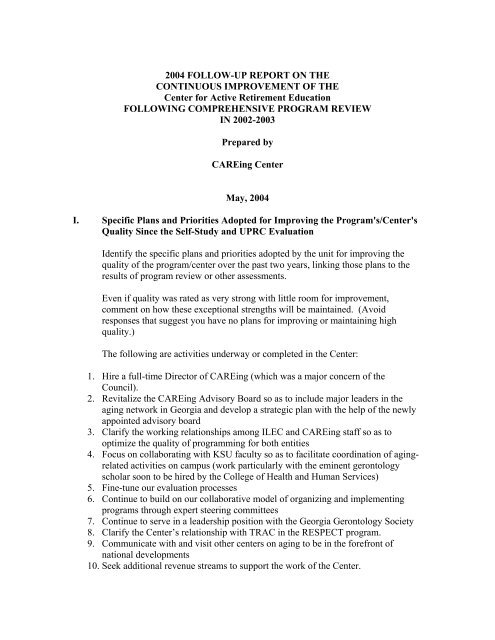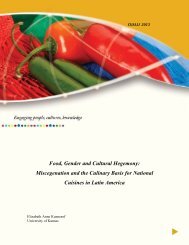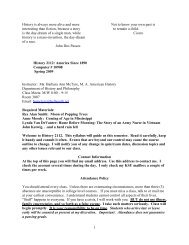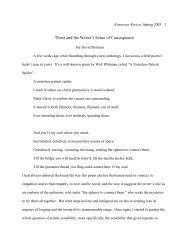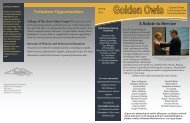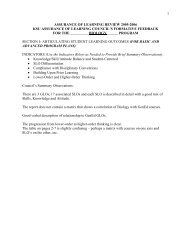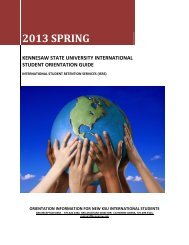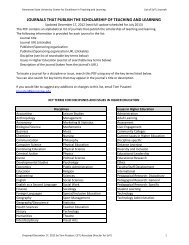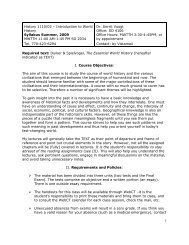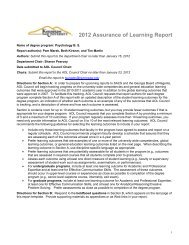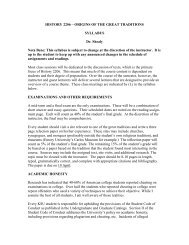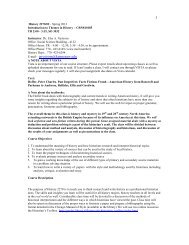CAREing Center - Kennesaw State University
CAREing Center - Kennesaw State University
CAREing Center - Kennesaw State University
Create successful ePaper yourself
Turn your PDF publications into a flip-book with our unique Google optimized e-Paper software.
2004 FOLLOW-UP REPORT ON THE<br />
CONTINUOUS IMPROVEMENT OF THE<br />
<strong>Center</strong> for Active Retirement Education<br />
FOLLOWING COMPREHENSIVE PROGRAM REVIEW<br />
IN 2002-2003<br />
Prepared by<br />
<strong>CAREing</strong> <strong>Center</strong><br />
May, 2004<br />
I. Specific Plans and Priorities Adopted for Improving the Program's/<strong>Center</strong>'s<br />
Quality Since the Self-Study and UPRC Evaluation<br />
Identify the specific plans and priorities adopted by the unit for improving the<br />
quality of the program/center over the past two years, linking those plans to the<br />
results of program review or other assessments.<br />
Even if quality was rated as very strong with little room for improvement,<br />
comment on how these exceptional strengths will be maintained. (Avoid<br />
responses that suggest you have no plans for improving or maintaining high<br />
quality.)<br />
The following are activities underway or completed in the <strong>Center</strong>:<br />
1. Hire a full-time Director of <strong>CAREing</strong> (which was a major concern of the<br />
Council).<br />
2. Revitalize the <strong>CAREing</strong> Advisory Board so as to include major leaders in the<br />
aging network in Georgia and develop a strategic plan with the help of the newly<br />
appointed advisory board<br />
3. Clarify the working relationships among ILEC and <strong>CAREing</strong> staff so as to<br />
optimize the quality of programming for both entities<br />
4. Focus on collaborating with KSU faculty so as to facilitate coordination of agingrelated<br />
activities on campus (work particularly with the eminent gerontology<br />
scholar soon to be hired by the College of Health and Human Services)<br />
5. Fine-tune our evaluation processes<br />
6. Continue to build on our collaborative model of organizing and implementing<br />
programs through expert steering committees<br />
7. Continue to serve in a leadership position with the Georgia Gerontology Society<br />
8. Clarify the <strong>Center</strong>’s relationship with TRAC in the RESPECT program.<br />
9. Communicate with and visit other centers on aging to be in the forefront of<br />
national developments<br />
10. Seek additional revenue streams to support the work of the <strong>Center</strong>.
II. Evidence of Improvements Achieved to Date for Quality Enhancement<br />
of the Program/<strong>Center</strong><br />
Of the plans and priorities cited in Section I, describe the improvements in<br />
program/center quality actually achieved to date and present supporting<br />
documentation of those achievements either here or in the Appendix (Section<br />
VIII).<br />
If substantial progress has been made on completing a particular action plan for<br />
quality improvement and full achievement will occur soon, report those<br />
developments here also. Otherwise, comments about any action plans which are<br />
largely unfinished or are scheduled for implementation in the future should be<br />
reported in Section VI.<br />
1. The program review council was very concerned about the <strong>CAREing</strong> <strong>Center</strong><br />
Director’s divided responsibilities as a result of her taking on the Directorship of<br />
the Institute for Leadership, Ethics and Character. As of January 1, 2004, there is<br />
now a full time (Interim) Director of <strong>CAREing</strong> alongside the ILEC Director.<br />
Their concern about “loss of focus and momentum” due to the merger of<br />
<strong>CAREing</strong> with ILEC should no longer be a problem.<br />
2. In January the <strong>CAREing</strong> staff met with the ILEC Director and President Siegel to<br />
plan for the future, and the <strong>CAREing</strong> Advisory Board revitalization is underway.<br />
Significant leaders in aging in Georgia have agreed to serve, such as the Director<br />
of Aging Services for Georgia’s Department of Human Resources, an elder leader<br />
from the Cobb Senior Citizen Council, as well as the KSU Deans of Health and<br />
Human Services and of Humanities and Social Sciences. The Director of ILEC<br />
will lead the advisory board in its strategic planning session on June 24, 2004, and<br />
every intention of the staff involves developing quality programs that meet needs<br />
and do not duplicate.<br />
3. The Council also expressed concern about <strong>CAREing</strong>’s possible loss of identity<br />
within ILEC, or in the case of emphasis only on leadership activities, <strong>CAREing</strong>’s<br />
loss of a reason to exist. The <strong>CAREing</strong> staff are comfortable within ILEC, and<br />
feel the Council misunderstood when it suggested <strong>CAREing</strong> had “changed its<br />
focus to provide leadership programs for senior citizens.” Developing<br />
professional leaders in the aging network remains a priority for <strong>CAREing</strong>.<br />
Working with elders also involves nurturing leadership. We feel that our solid<br />
emphasis on aging-related activities gives us a clear focus within ILEC. We do<br />
not duplicate, but sometimes may collaborate. For example, last year’s successful<br />
Conversations with Sages program, led by Barbara Hammond, ILEC Fellow for<br />
Character, will become a collaborative venture this coming year with <strong>CAREing</strong>.<br />
We have sent an e-mail to all faculty asking for their help in expanding the<br />
2
program, including both seven Conversations programs in 2004-05, as well as a<br />
speakers bureau of elders available for class presentations on topics related to<br />
class content (see Appendix for documentation of this point).<br />
4. Another indicator of concern with quality of programming is the <strong>Center</strong>’s typical<br />
approach of collaborative effort with faculty and community citizens. Both the<br />
Art of the Golden Generation and the Poetry Contest/Celebration Day follow the<br />
model of using a steering committee with expertise in the area (including in the<br />
first case, visual arts faculty, and in the second case, English Department faculty)<br />
to ensure quality. Although there is now a full time director of <strong>CAREing</strong>, we are<br />
still a small staff and depend on working with those with expertise and passion<br />
about a topic in order to bring off successful programs. The Council’s concern<br />
about duplication of programs related to aging around the <strong>University</strong> is wellplaced,<br />
and <strong>CAREing</strong> strives to serve in helping to improve coordination. More<br />
and more, <strong>CAREing</strong> appears to be recognized as a focal point on aging concerns<br />
on campus, as we receive requests for assistance from both individuals with<br />
caregiving concerns in need of information and from others with professional<br />
interests. Both HPS faculty and Career Services staff have recently contacted<br />
<strong>CAREing</strong> about possible collaborative activities. We also wrote with Dr. Judy<br />
Holzman a grant proposal for an intergenerational program directed toward<br />
minority elders, which was not funded. We are pleased to be developing<br />
credibility on campus as facilitators and supporters of activities related to aging.<br />
5. Evaluation forms have been revised so as to get a clearer understanding of<br />
participants’ needs and applicability of programs to work settings (see Appendix<br />
for documentation of this point). The Council stated a concern in the program<br />
review that indicators listed were “primarily productivity indicators not quality<br />
indicators.” Program evaluation has been and remains a crucial goal for the<br />
<strong>Center</strong>. We consider participants’ evaluations of programs to be indicators of<br />
quality. Evaluation data are available upon request for our programs, including<br />
the Professional Development in Gerontology Program (PDGC) and the<br />
Northwest Crescent Consortium on Active Retirement and Aging (NCCARA).<br />
We regularly receive highly positive evaluations, and we take seriously and act<br />
upon the comments and suggestions made by participants. For example, Parc<br />
Communities (senior living in East Cobb, Duluth, and opening soon, Buckhead)<br />
approached <strong>CAREing</strong> to develop quarterly staff development activities for their<br />
employees. (This relates to the question of public recognition received by the<br />
<strong>Center</strong>, and the Council’s concern that awards had been received by individuals<br />
not the <strong>Center</strong> itself. In addition, we are also in conversations with the Assisted<br />
Living Federation of America to provide trainings for their independent living<br />
members.) We now have an agreement to provide quarterly staff development<br />
classes to Parc employees. They requested that we offer the same class twice, a<br />
week apart, so that all their employees could participate. The first class<br />
evaluation was highly positive, but we were asked if we could tie the class<br />
presentation more directly into the work situation of the employees. The<br />
instructor and <strong>CAREing</strong> staff immediately fine-tuned the next week’s repeat of<br />
3
the class to allow for students to discuss the implications for their work situations.<br />
The Regional Vice-President e-mailed the <strong>CAREing</strong> Director with thanks and the<br />
comment that our responsiveness was “exceptional” (see Appendix for<br />
documentation of this point).<br />
Other indications of the quality of our programming involve indirect measures:<br />
the increasing number of members of NCCARA, increasing numbers of<br />
participants in NCCARA programs as well as the Professional Development in<br />
Gerontology Certificate Program. This year’s PDGC class closed with the full<br />
capacity of 20 students. Also, the fact that KSU staff and faculty come to us with<br />
ideas for collaboration, and that outside groups like Parc Communities and the<br />
Assisted Living Federation of America come to us for educational programming,<br />
seem to be positive measures of the perceived quality of our work. At this time<br />
we are in the process of implementing a needs assessment. Six hundred four<br />
surveys were sent out and 65 have been returned so far (see Appendix for<br />
documentation of this point).<br />
6. The 2004 Phenomenal Women’s Conference is the most recent example of our<br />
successful implementation of a program through the use of an expert steering<br />
committee.<br />
7. The <strong>CAREing</strong> Interim Director continues to provide regular e-mail blasts to<br />
members of the GGS around the state and also was elected to the Board of the<br />
GGS. She has assisted with a new process of encouraging wider participation in<br />
the annual meeting by allowing for submission of proposals to present at the<br />
annual meeting.<br />
8. The Director has written the Director of TRAC seeking clarification of<br />
<strong>CAREing</strong>‘s role in the RESPECT program (see Appendix for documentation of<br />
this point).<br />
9. The Interim Director attended the Association for Gerontology in Higher<br />
Education meeting in February and participated in a roundtable discussion on<br />
centers on aging (resulting in a continuing email contact with other center<br />
directors). She also plans to visit the highly esteemed <strong>University</strong> of South Florida<br />
Institute on Aging in June 2004 (using travel money remaining from her 2004<br />
KSU Distinguished Service award, not <strong>CAREing</strong> travel money).<br />
10. The Council was somewhat concerned about the return on investment made by<br />
the <strong>University</strong> in the <strong>CAREing</strong> <strong>Center</strong>. Although we have gained a position in the<br />
Director of the <strong>CAREing</strong> <strong>Center</strong>, no additional funding is being provided in<br />
support moneys. We are working hard to develop additional revenue streams and<br />
have obtained the following:<br />
a. PDGC registration fees: The $500 course fee has been raised for the first<br />
time, to the amount of $650, but this includes lunch and all course<br />
materials including text book. If we manage to fill the class to capacity,<br />
4
20 students will bring in a gross total of $13,000. Some of these fees are<br />
covered by the Cobb Senior Citizen Council through their scholarship<br />
program for Cobb residents.<br />
b. NCCARA memberships mainly cover the cost of providing food to<br />
participants, however, we do usually come out a little ahead, giving us the<br />
chance to support other programming. There are 23 organizational<br />
members and 32 individual members in 2004.<br />
c. We received a $1000 grant from the American Society on Aging/MetLife<br />
Foundation. A nationally renowned speaker will come at the expense of<br />
ASA/MetLife.<br />
d. We signed a Letter of Agreement with Parc Communities to provide staff<br />
development for their employees, allowing us to pay faculty to present and<br />
to add to our own budget.<br />
e. The Cobb YMCA Kickers presented the <strong>Center</strong> with a small endowment,<br />
and each year give us a contribution in varying amounts, this year being<br />
$900.00.<br />
III. Specific Plans and Priorities Adopted for Improving the Program's/<strong>Center</strong>'s<br />
Productivity Since the Self-Study and UPRC Evaluation<br />
Follow the guidance given in Section I as it would pertain to adopted plans and<br />
priorities for enhancing the productivity of the program/center.<br />
1. Develop the <strong>CAREing</strong> web site to improve visibility and utility for potential<br />
participants and persons in need of information related to aging.<br />
2. Increase marketing capability so as to reach more potential participants<br />
3. Offer new, innovative forms of staff development activities beyond the nine-<br />
month, on-campus PDGC Program.<br />
4. Remain active in national professional conferences so as to increase the<br />
visibility of the <strong>Center</strong> in the national aging network<br />
5. Increase monetary support for the <strong>Center</strong> so as to grow more programs<br />
6. Involve more elders in our programming<br />
7. Offer support, information, and material for the campus community in regard<br />
to aging issues. In order better to serve the campus community in need of<br />
information about caregiving resources and issues related to aging relatives,<br />
we plan to develop a resource library to have answers and materials readily<br />
available for questions that come in with some regularity. Eventually we may<br />
offer such support on our web page and advertise it to faculty and staff.<br />
IV. Evidence of Improvements Achieved to Date for Productivity<br />
Enhancement of the Program<br />
Follow the guidance given in Section II as it would pertain to improvements<br />
achieved in the productivity of the program/center.<br />
5
1. The <strong>CAREing</strong> web site has become very useful, advertising current events and<br />
offerings, and allowing for online registration for activities. We consider this<br />
to be a highly productive aspect of our setting within ILEC, as the web<br />
manager works well for all ILEC and <strong>CAREing</strong> staff.<br />
2. We have doubled the number and variety of people and organizations we now<br />
market to. Attendees come from all over the metro area and state. For<br />
example Christian City employees come from south of the Atlanta airport for<br />
the quarterly NCCARA meetings. Ten of the twenty PDGC students in the<br />
current class work at the federal agency in Atlanta, the <strong>Center</strong>s for Medicare<br />
and Medicaid Services. The number of NCCARA members has doubled since<br />
the program review. The number of PDGC scholarships given by the Cobb<br />
Senior Citizen Council has increased. NCCARA participation has increased<br />
from an average of 60 to last year’s average of 90.<br />
3. We have a memo of agreement to offer quarterly staff development activities<br />
for Parc Communities at their East Cobb location.<br />
4. We have presented on <strong>CAREing</strong> at the Association for Gerontology in Higher<br />
Education, and will be presenting a second time at the Florida Council on<br />
Aging in August 2004. We were one of ten recipients of a national grant<br />
from MetLife (out of 97 applicants).<br />
5. Last year AARP donated $750 in support of <strong>CAREing</strong> programs. We have<br />
received a $1000 ASA/MetLife/MindAlert grant to bring a national scholar,<br />
Dr. James Birren, for our August NCCARA conference. So far two Hospices<br />
have signed on as sponsors for our October NCCARA conference which will<br />
feature a nationally renowned speaker, Dr. Ira Byock.<br />
6. We have invited faculty to suggest names of elder sages to participate in the<br />
Conversations program as well as to be listed as possible class speakers.<br />
V. Current Status of the Program's/<strong>Center</strong>'s Viability<br />
Report the current status of the program's/center's overall viability and comment<br />
on any improvements or changes in the program's viability since the self-study<br />
and UPRC evaluation.<br />
Considering the Council’s major concern with the dilution of efforts on the part of<br />
the ILEC/<strong>CAREing</strong> <strong>Center</strong> Director, the current separation of directorships of<br />
ILEC and <strong>CAREing</strong> satisfies that concern. <strong>CAREing</strong> is finding a comfortable<br />
place within ILEC, collaborating in some cases, focusing separately on agingrelated<br />
issues. Momentum is strong, based on the solid basis developed over the<br />
five years of the <strong>Center</strong>’s existence and the community and campus ties<br />
established.<br />
6
<strong>CAREing</strong> eagerly anticipates working closely with the new eminent scholar in<br />
gerontology who will be located in the College of Health and Human Services.<br />
The Interim Director participated in the hiring process and feels confident about<br />
the viability of the potential relationship with the gerontology scholar.<br />
Community and professional ties remain strong, as we honor the expertise of our<br />
partners and seek to efficiently develop programs and facilitate what faculty<br />
themselves lack the time to do. We are being asked to help with programming<br />
now and are recognized for our efforts in gerontology.<br />
We constantly attempt to remain in touch with our constituencies through regular<br />
evaluations.<br />
Strategic planning is very important to us, along with regular assessment of all our<br />
activities. A copy of the new strategic plan, which will be developed by the<br />
revitalized advisory board on June 24, 2004, will be forwarded as an Addendum<br />
to this report.<br />
VI. Specific Plans and Priorities for Continuing Program Improvement in the<br />
Future<br />
Comment on the status of the unit's plans and priorities for continuing<br />
improvement of the program/center.<br />
The staff of the <strong>Center</strong> are highly attuned to the developmental status of the<br />
<strong>Center</strong>. Besides regular evaluations of our programs, we are developing our<br />
report for the Advisory Board’s June strategic planning meeting, where we will<br />
earnestly seek their expert advice and recommendations regarding our<br />
programming so as to monitor and ensure program improvement.<br />
VII. Timetable for and Progress Made Toward Removing the Program from<br />
the Regents' Triggered List of Programs with Exceptionally Low<br />
Productivity (If Applicable)<br />
Insert "Not Applicable" unless the program was "triggered" by the Board of<br />
Regents for special review because of low productivity in number of majors or<br />
degrees awarded.<br />
Describe and document annual gains made over the past two years in degree<br />
productivity and/or enrollment of majors from the period of time when the<br />
program was triggered for low productivity. If the Regents' productivity<br />
minimums have not yet been surpassed, present a projected timetable for when<br />
the program will achieve that goal. Describe all efforts currently underway or<br />
planned to achieve gains toward that goal.<br />
7
If it does not appear possible for the program to exceed the Regents' productivity<br />
minimums in the future, explain why that is the case. In this instance, comment<br />
on the offsetting measures taken and achieved to maximize program viability and<br />
program quality despite low program productivity.<br />
Not Applicable<br />
VIII. Appendix of Supporting Documentation (If Needed)<br />
Significant supporting evidence and documentation can be referenced in the text<br />
and included in this appendix. Please avoid the inclusion of material of minor<br />
significance in the appendix.<br />
8


